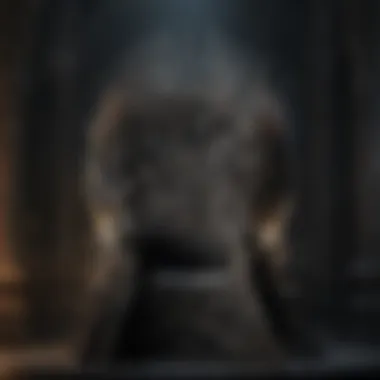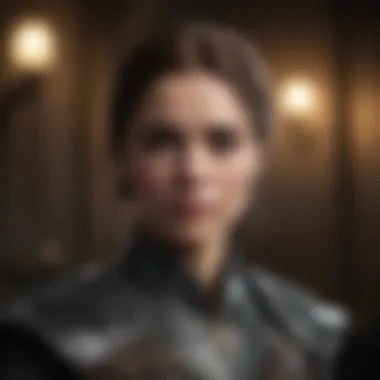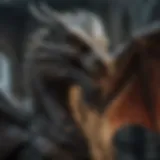Character Tests in Game of Thrones: Identity and Destiny


Intro
In the realms of Westeros, Game of Thrones has woven a rich tapestry of characters whose journeys unfold under the pressure of staggering moral tests. These character trials are not merely hurdles to be crossed; they reveal deep layers of loyalty, ambition, and vulnerability. Each character is a unique puzzle, shaped by the challenges they face—situations that often force them to choose between personal desires and the greater good. As we peel back the layers of these tests, we find that they play a crucial role in molding identities and influencing destinies within the epic saga.
The trials encountered by the likes of Eddard Stark, Daenerys Targaryen, and Jaime Lannister invite us to ponder complex themes of ethics and justice. The choices they make are not only pivotal for their character arcs, but they also resonate with audiences in ways that extend beyond the screen. Let's embark on an exploration of these character tests, examining not only the individuals but also the broader implications for our understanding of morality in torn landscapes like those found in the Seven Kingdoms.
Character Dissections
Detailed Analysis of Key Characters in Game of Thrones
Individual struggles shape the narrative thread of Game of Thrones, with critical character developments illuminating the human experience.
Eddard Stark: Known for his unwavering sense of honor, Eddard's character faces a harrowing test in the first season. He is thrust into the vicious political intrigue of King’s Landing, ultimately leading to his tragic downfall. His adherence to honor, while noble, becomes a double-edged sword as he confronts a world where pragmatism often outweighs morals.
Daenerys Targaryen: Daenerys’s journey from a timid girl to the Mother of Dragons is peppered with tests of resolve and ethics. Each decision she makes, from liberating slaves to contemplating fire and blood, reflects a complex dance between her inherited sense of justice and the authoritarian path she sometimes treads.
Jaime Lannister: Jaime's evolution from the Kingslayer to a character seeking redemption showcases a remarkable arc of transformation. His interactions—especially with Brienne of Tarth—challenge preconceived notions of honor and loyalty, illustrating how character tests can forge unexpected alliances and faith within oneself.
Character Development Throughout the Series
The growth of these characters is not linear and often reflects the choices thrust upon them.
- Eddard's tragic end starkly contrasts with what a leader should embody.
- Daenerys's transformation grapples with the lust for power, teetering between benevolence and tyranny.
- Jaime's attempts to reclaim a sense of honor demonstrate that redemption is an ongoing test.
These trajectories underscore a significant theme: “In Westeros, every choice carries weight, whether noble or self-serving.”
Impact on the Overarching Storyline
The trials faced by these characters ripple through the narrative, influencing not just their fates but also those of others. The consequences of Eddard Stark's choices set off a chain reaction of conflict, while Daenerys's quest for the throne carries implications for the entire realm. In many ways, the fabric of Westeros hinges on individual tests of character.
"Character is not just what you do, but who you are when faced with extreme circumstances."
Understanding these characters deepens our grasp of the story's moral dilemmas. Their journeys illuminate how the essence of humanity is revealed under duress, prompting viewers to reflect on their understanding of loyalty and ethics.
Episode Breakdowns
Recap of Significant Events in Each Episode
As we transition deeper into the series, each episode serves as a distinct chapter in the unfolding saga of character tests. Key episodes create turning points that shape individual arcs and the broader narrative context.
Exploration of Themes and Symbolism
Several episodes delve into themes of betrayal, loyalty, and the relentless pursuit of power. These elements are often represented through symbolic imagery and character interactions that reinforce the pressing moral questions at the heart of the series. For instance, the Iron Throne itself becomes a symbol of desire that tests each claimant's moral integrity.
Key Moments and Their Implications
Highlighting essential scenes, such as the Red Wedding or the Battle of the Bastards, we can trace the trajectory of personal and collective strife. Each moment not only impacts a character's fate but also reflects key ideological struggles—like justice versus revenge—that resonate profoundly with viewers.
Lore Explorations
Delving into the Rich History and Lore of Westeros
The character tests found in Game of Thrones are intertwined with the intricate history of Westeros. The lore adds depth, painting a fuller picture of the conflicts and ideologies that drive characters to make pivotal decisions.
Uncovering Hidden Details and Connections
As we dissect character trials in the series, it's essential to consider the broader context of the lore, which enriches our understanding of their motivations and actions. Each lineage, from the Starks to the Lannisters, carries historical burdens that influence their choices during moral dilemmas.
Exploring the Cultural and Mythical Aspects of the World


Westeros stands as a reflection of real-world themes—betrayal, honor, and the quest for power. Characters often invoke cultural traditions or myths, grounding their trials in a rich narrative heritage. These elements bolster the show’s complex portrayal of human nature.
Fan Theories
Compilation of Popular and Intriguing Fan Theories
The fandom surrounding Game of Thrones is rife with theories that speculate on character motivations and future developments. From theories about Jon Snow's parentage to the possibility of a surviving Targaryen, discussions abound.
Evaluation of Theories Based on Evidence from the Show
Many of these theories are rooted in subtle hints dropped throughout the storyline.l These hints challenge viewers to rethink character arcs and question their understanding of morality and destiny.
Speculation on Future Plot Developments
As the series grapples with ethical dilemmas, it leads fans to theorize about each character's ultimate fate. The weight of past choices shapes how viewers perceive these potential resolutions, fostering a sense of anticipation mingled with dread.
Through each layer of exploration—from character analyses to thematic expositions—Game of Thrones serves as a gripping reflection on human nature itself. As we continue to dissect these themes, we appreciate the rich narratives brought forth by these formidable character tests.
Prolusion to Character Tests
In the world of Game of Thrones, character tests serve as pivotal moments that shape the narrative and the very foundations of its characters. These trials are not simply plot devices; they delve deeply into the psyche of the individuals involved, revealing their true nature, fears, and ambitions. Such insights are essential, as they allow audiences to grasp the complexities of the human condition illustrated throughout the series.
Character tests can take many forms—moral dilemmas that question loyalty, physical challenges that test endurance, or social entrapments that manipulate connections among characters. Each of these trials plays a crucial role in developing their arcs, enriching the storyline, and, ultimately, highlighting the ever-present themes of power, justice, and survival in the brutal confines of Westeros.
Defining Character Tests
Character tests, at their core, are challenges that characters must navigate, often subjected to intense scrutiny and pressure. Think of Eddard Stark facing his moral compass when it comes to the execution of a traitor, or Daenerys grappling with the consequences of her relentless pursuit of power. These scenarios act as mirrors, reflecting both their strengths and weaknesses.
In a broader sense, character tests can be defined through three main categories:
- Moral Dilemmas: Conflicts between personal values and external demands.
- Physical Challenges: Tests that require endurance, skill, and sometimes sheer luck.
- Social Entrapments: Situations that manipulate relationships and power dynamics.
By dissecting these tests, we understand how they catalyze change, prompt reflection, and often lead to irreversible consequences. It reveals just how fragile alliances and personal convictions can be in a world driven by greed and revenge.
The Importance of Character Development
Character development in Game of Thrones is intricately tied to these tests. The series is rich with instances where individuals are faced with their worst nightmares, ultimately shaping who they become.
For example, Jon Snow's evolving sense of duty is repeatedly challenged by his commitment to the Night's Watch versus his desire for an honorable life. Each character's response not only fuels their personal growth but affects the relationships they hold with others, creating a tapestry of interwoven destinies.
The importance lies in the deep explorations of morality. Every trial pushes characters to either embrace their flaws or strive for redemption, propelling the plot forward while inviting viewers to ponder what they might do in similar circumstances. In this way, character tests become a way for the audience to engage with the narrative, forming connections not just with the characters but with the human experiences they represent.
"In the face of life's challenges, we reveal who we truly are."
As we embark on this exploration of character tests in Game of Thrones, it’s crucial to reflect on how these seismic events compel characters to confront their inner selves. The consequences that stem from their choices resonate throughout the series, inviting us to question our beliefs and values in the face of adversity.
Types of Character Tests
In Game of Thrones, character tests come in varied forms, each serving to add richness to the narrative and depth to individual characters. These tests are not merely expedients to push the plot forward but are fundamental shaping forces that determine the arc and the eventual destinations of the characters we encounter. They expose the inner workings of a character’s psyche, revealing their values, flaws, and the choices they stand ready to make. By exploring these tests, we understand what drives ambition or dampens hope and how external pressures can challenge a person’s moral compass.
Character tests blend the physical, ethical, and relational into a confluence of chaos, echoing that life often throws more than one challenge at a person.
Moral Dilemmas
Moral dilemmas in Game of Thrones present scenarios that force characters to choose between conflicting ethical principles. Take Eddard Stark, for instance. By willing to honor his oath, he faces the death knell of his idealism as he strives to adhere to his sense of duty. When asked to betray his values in favor of survival, the stage is set for reflection on sacrifice and the weight of loyalty. These tests uncover not just the flawed nature of morality but the rather complicated realm of human decision-making. The viewers witness how your principles can lead to glory or catastrophe and how the elements of exigency and emotional weight combine to form a potent brew, compelling characters to weigh their options under duress.
Physical Challenges
In addition to moral dilemmas, physical challenges in Game of Thrones showcase the resilience and sheer tenacity of its characters. Jon Snow’s journey beyond the Wall puts him in an unforgiving environment that necessitates strength and wit. Characters find themselves battling not just formidable adversaries but also the elements themselves. For instance, Cersei Lannister’s confrontations often imbue her character with the unwavering belief that physical power intertwines with ruthless ambition. Such trials can reveal vulnerability, drive, and ambition, compelling a character to adapt or falter under strenuous conditions. These moments ultimately highlight the physical and emotional stamina required to navigate the brutal landscape of Westeros.
Social Entrapments


Social entrapments weave a complex web around the characters, pressing them into forms of conformity or rebellion against societal norms. Sansa Stark’s development is an example of navigating through treacherous social networks; she adeptly learns to wield social influence, even as she faces oppressive surroundings. The struggle between personal identity and external expectations becomes palpable. Such tests reveal the intricate dynamics of power, influence, and survival. Audiences witness how social forces can either uplift or ensnare, often leading to unforeseen alliances or catastrophic betrayals. Questions arise around loyalty and alignment, encapsulating how the very fabric of society can dictate and scrutinize one’s choices.
In these tests—moral, physical, and social—we glean insights that define characters, elucidate motivations, and challenge viewers to contemplate the broad spectrum of human experience articulated through the saga of Game of Thrones. Each type of test is integral, revealing that where one stands often depends on the sum of all trials faced in a tumultuous world.
In the world of Game of Thrones, character tests serve as pivotal moments that define not just individual arcs but also the broader narrative. These tests are more than mere plot devices; they are reflections of fundamental dilemmas that shape characters’ moral compasses and destinies. Each test reveals a different facet of a character’s identity, showcasing how deeply engrained values can be challenged or upheld.
Character tests foster a resonance with viewers who have their own values and ethical quandaries. They invite the audience to reflect on their own belief systems, perhaps prompting one to question, "Would I have done the same?" As we explore characters like Eddard Stark, Daenerys Targaryen, and Jon Snow, we witness how they navigate through their challenges, ultimately leading to profound transformations—or tragic downfalls.
The juxtaposition of their decisions against the backdrop of the harsh realities of Westeros brings engaging themes into the light, creating a rich tapestry of loyalty, ambition, and responsibility. Let’s delve into specific significant character tests that leave enduring impressions.
Eddard Stark's Honor
Eddard Stark embodies honor in one of the most tumultuous environments imaginable. His unwavering commitment to justice is tested right from his introduction. The pivotal moment arrives when he is faced with the execution of a deserter from the Night's Watch. The choice to execute the man highlights Eddard's belief in upholding the law, even when emotions may spur him to act differently. Here, we see his character tested against survival instincts and a moral code.
However, the true test emerges later when he faces the direct consequences of his honesty in King’s Landing. When ordered to betray his principles for political gain, he struggles immensely. Ultimately, Eddard’s adherence to honor leads him to a tragic end. His fate serves as a harsh reminder that in a world rife with deception, honor can sometimes equate to a death sentence. The sacrifice of Eddard Stark poignantly illustrates that sticking to one’s principles can come with dire consequences, making this character test one of the most significant in the series.
Daenerys Targaryen's Choices
Daenerys Targaryen represents a complex character arc where choices define her journey from a frightened girl to a powerful leader. Her character tests vary widely, from decisions about slavery to warfare. Each choice reveals the layers of her evolving identity as the Mother of Dragons.
One of Daenerys’s most notable tests occurs when she has to decide whether to rule with mercy or fear. After conquering Meereen, she faces the dilemma of implementing justice vs. exercising her newfound power ruthlessly. Her decisions to crucify masters or free slaves illustrate a struggle between the ideals she wishes to embody and the brutal realities of governance.
In the ultimate scene of her arc, Daenerys's choice to burn King's Landing sparks a fierce debate amongst fans. This moment embodies the tension between her drive for power and the moral implications of her actions. Daenerys’s journey underscores that choices are laden with consequences that define not only who you are but also how others perceive you.
Jon Snow's Loyalties
Jon Snow embodies the struggle between loyalty and identity. Throughout the series, his character is faced with tests that continually challenge where his true allegiances lie. Initially seen as the illegitimate son of Eddard Stark, Jon grapples with his identity while serving in the Night's Watch, proving his mettle time and again.
His loyalty to his brothers at the Night’s Watch leads to a significant moment when he is faced with the choice of choosing between the demands of the Watch and his growing bond with the Wildlings. His decision to help the Wildlings speaks volumes about his character evolution. This decision highlights Jon's belief in a broader sense of honor that transcends traditional loyalties.
A later test of loyalty unfolds amid the chaos of battles against the White Walkers. Jon finds himself torn between his Stark lineage and the relationships he's built. His ultimate decision to support Daenerys illustrates how loyalty can shift based on situations and alliances in a world where individual motivations are constantly at stake. Jon's experiences echo the sentiment that in life's grand chess game, jugging balls of loyalty while navigating the treacherous waters of identity is no easy asks and often leads to heart-wrenching outcomes.
The Outcome of Character Tests
The journey through Game of Thrones is rife with trials that define characters and push them to their limits. The outcome of these character tests often paints a vivid picture of what each character stands for, serving as a commentary on human nature itself. Understanding how these trials result in success or failure can help us appreciate not just the characters but also the series' overarching themes such as morality, loyalty, and the often blurred lines between right and wrong.
Success and Failure
In Game of Thrones, success and failure aren’t merely black and white. Characters often experience victories that come at a high cost, or failures that lead to unexpected consequences. For instance, when Tyrion Lannister orchestrates the defense of King's Landing in the Battle of the Blackwater, his strategies lead to a temporary success, but this is shadowed by loss of life and his growing estrangement from his family. Such layers of success paint a complex picture of what achieving one's goals truly means.
Similarly, consider the fate of Robb Stark. His early successes in battle create a sense of invincibility that ultimately contributes to his downfall. The triumph he experienced wasn't truly a triumph. It was a setup for the infamous Red Wedding, a test of loyalty and betrayal that underscored the brutal nature of the war for the Iron Throne. This fracturing of success hints at a central truth in Game of Thrones: success can often lead to unforeseen failure.
"The true measure of success is not how high you climb, but how well you trust those who climb with you."
Thus, the interplay of success and failure requires viewers to rethink their definitions of victory. A triumph may come with unexpected hurdles, while apparent failures might pave ways to unforeseen opportunities. This duality creates a rich tapestry of narrative that audiences can dissect and discuss.
Character Growth and Regression
Character growth and regression form the crux of personal journeys in Game of Thrones. They illustrate how characters evolve in response to the tests they face. Take the transformation of Jaime Lannister. Early in the series, he’s portrayed as arrogant and ruthless, but after being captured and subsequently developing a bond with Brienne of Tarth, he experiences profound growth. His understanding of honor deepens, revealing that character tests can lead to significant self-discovery.
On the other hand, we have characters like Daenerys Targaryen, whose quest for power initially reveals noble intentions but eventually spirals into tyranny. Her evolution from liberator to conqueror illustrates regression fueled by ambition, showcasing how power can corrode even the most well-intentioned individuals. The deeper narrative here invites viewers to contemplate the psychological factors driving these characters—are their choices reflective of their true selves or dictated by their circumstances?
Ultimately, both growth and regression demonstrate that in Game of Thrones, every test is an opportunity for either enlightenment or degradation. These outcomes are compelling reflections of reality, resonating with the audience’s understanding of not just fantasy, but human experience in general.
Themes Emerged from Character Tests
Character tests in Game of Thrones do not merely serve as narrative devices; they unveil underlying themes that resonate deeply within the series. Each test acts as a prism, refracting aspects of human nature. These challenges illuminate motives, alliances, and the conflicts that arise as characters navigate the treacherous landscape of Westeros. Understanding these themes offers insight into the ethical dilemmas the characters face and the broader existential questions posed by the show.
Loyalty vs. Ambition


Loyalty and ambition are two potent forces at play in Game of Thrones, often clashing in intense character tests. For instance, characters like Robb Stark showcase the noble aspect of loyalty, risking personal gain for the sake of family and honor. Conversely, we see individuals like Petyr Baelish epitomize ambition by manipulating others to ascend the political ladder.
The tension between these two themes raises a compelling question: can one maintain loyalty while pursuing ambition? Robb's ultimate downfall serves as a cautionary tale of misplaced loyalty as he prioritizes his commitments over strategic ambition. This conflict challenges viewers to consider the costs involved in both loyalty to loved ones and the pursuit of power.
Power and Responsibility
Power in Game of Thrones is rarely an unambiguous gift; it is intertwined with profound responsibility. Characters such as Daenerys Targaryen grapple with the burdens that accompany power. Her character arc illustrates how the quest for liberty can morph into a quest for domination.
Responsibilities often become more pronounced as characters ascend to power. As Ned Stark learns the hard way, wielding power without discernment can lead to catastrophic consequences. The famous line "the man who passes the sentence should swing the sword" encapsulates this notion. This theme invites viewers to ponder, what is the true nature of power? How do individual choices influence the collective fates of others?
Justice and Retribution
Justice and retribution weave a complex web in the world of Game of Thrones. Characters are frequently faced with the question of what constitutes just action in a world rife with betrayal. Tyrion Lannister often embodies the struggle for justice amidst a backdrop of systemic corruption. His journey reflects a desire to break the cycle of vengeance, but the game of thrones rarely allows such ideals to thrive.
In stark contrast, other characters, like Cersei Lannister, demonstrate retribution as a primary motivator, leading them down darker paths. Understanding the characters’ varying perspectives on justice prompts the viewer to reflect on moral philosophy. It raises critical points about the efficacy of revenge and the often-blurred lines between justice, vengeance, and morality.
"The things we do for love are the things that destroy us."
As the story unfolds, the complex themes that emerge from character tests encourage a deeper reflection on our understanding of loyalty, power, and justice. Ultimately, these tests are not only about the characters’ struggles but also about the viewer’s engagement with fundamental human truths.
Character Tests in a Broader Context
Character tests within the univers of Game of Thrones are not just confined to individual plot points; they reverberate throughout the entire narrative, echoing the complexity of human experience in the world of Westeros. These tests provide a foundation, shaping characters in profound ways, while influencing the overarching story.
Impact on Plot Development
Character tests play a crucial role in plot progression. They often serve as the catalyst for significant events within the series. When characters face ethical or moral challenges, their responses don’t just inform their personal arcs; they often propel the narrative in new directions. For example, Eddard Stark's insistence on honesty leads to his downfall but also sets off a chain of events that reshapes the political landscape of Westeros.
- Characters like Tyrion Lannister navigate treacherous waters through cunning and intellect, reflecting the harsh realities of survival in a ruthless environment.
- Daenerys Targaryen’s character tests, particularly her moral dilemmas in ruling, dictate her transformation from a scared girl to a formidable queen.
- Each trial faced by the characters nudges the story into unforeseen territories, forcing allies to become enemies and vice versa.
These moments do more than inject drama; they weave a rich tapestry that connects the fates of different houses, reigniting old feuds and shaping alliances based on the outcomes of these challenges.
Influence on the Audience
The character tests resonate deeply with viewers, offering insights into not just the fantasy world but also the moral underpinnings of our own society. Characters struggle with choices that reflect real-life dilemmas, allowing the audience to engage on a personal level.
"Each character’s trial acts as a mirror, reflecting not just their values but evoking introspection in viewers, making them consider what they might do in similar situations."
- Loyalty vs. ambition, love vs. duty—these are universal themes that compel the audience to reflect. For instance, Jon Snow's grappling with his Stark roots against his loyalty to the Night's Watch resonates with viewers who’ve faced similar loyalty conflicts in their own lives.
- The audience often finds themselves rooting for characters not just because of their actions, but because of their moral struggles. This layered characterization fosters a connection, deepening emotional investment in the series.
Culmination: The Legacy of Character Tests
Character tests in Game of Thrones serve a vital function in the storytelling. They do not merely engage the audience; they shape the very essence of the characters within the narrative. This article has explored multiple facets of character tests, highlighting how challenges—moral, physical, and social—contribute to the evolution of the characters.
The legacy established through these tests can be summarised into several key elements: the intense moral choices faced by characters not only affect their destinies but also resonate deeply with the audience's own perceptions of right and wrong.
Additionally, these trials often push characters toward growth or reveal their inherent weaknesses, painting a complex portrait of humanity. Issues of loyalty, ambition, justice, and retribution permeate the series, all stemming from these character tests.
One cannot overlook the benefits derived from examining these elements. They stir contemplation on ethics and the decisions we make under pressure, prompting viewers to consider their own beliefs and values in a world that often feels akin to the ruthless landscape of Westeros. Without these tests, the rich narratives and character arcs we see would simply fall flat, leading to an unremarkable journey through the series.
"Every action has consequences, and that’s a truth that resonates through every character's journey in Game of Thrones."
Reflections on Morality
The moral landscape of Game of Thrones is a treacherous one, where characters often find themselves grappling with dilemmas that challenge their very being. Unlike typical fantasy narratives, where the good guys wear white hats, this series introduces a gray area that forces viewers to reflect on the nature of morality.
Take, for instance, Jaime Lannister’s arc infused with moral ambiguity—first perceived as a villain for his actions, yet slowly revealing layers that spark sympathy and understanding. Or, look at Tyrion Lannister, who constantly balances shrewdness with a strong moral compass, often leading to consequences that many don’t see coming.
These portrayals incite viewers to reflect on their own moral compass. In moments of dire character testimonies, we witness not just the struggles of the characters but also our inner conflicts that surface when we're faced with tough choices. Thus, the characters serve as mirrors, reflecting our own moral predicaments.
Understanding Humanity through Challenges
At the core of Game of Thrones lies an exploration of what it means to be human, with all the glorious strengths and tragic flaws that come with it. Each character test provides a window into the multifaceted human experience.
Challenges force characters to confront harsh realities, revealing fears, aspirations, and vulnerabilities. Jon Snow’s journey captures this magnificently—born a bastards, he embraces his identity and fulfills his potential while facing societal rejection. In contrast, Daenerys Targaryen’s rise and subsequent fall depict the dangers of power unchecked by empathy and wisdom.
By understanding these characters' challenges, viewers gain insights into their own lives—how hardships can mold one's character or lead to downfalls. Analyzing the trials faced by characters leads not only to a greater appreciation of the narrative but also helps illuminate the intricate weave of circumstances that define humanity itself.
This nuanced understanding bridges the gap between fantasy and reality, encouraging audiences to contemplate how they might also navigate their own personal trials in an unpredictable world.



